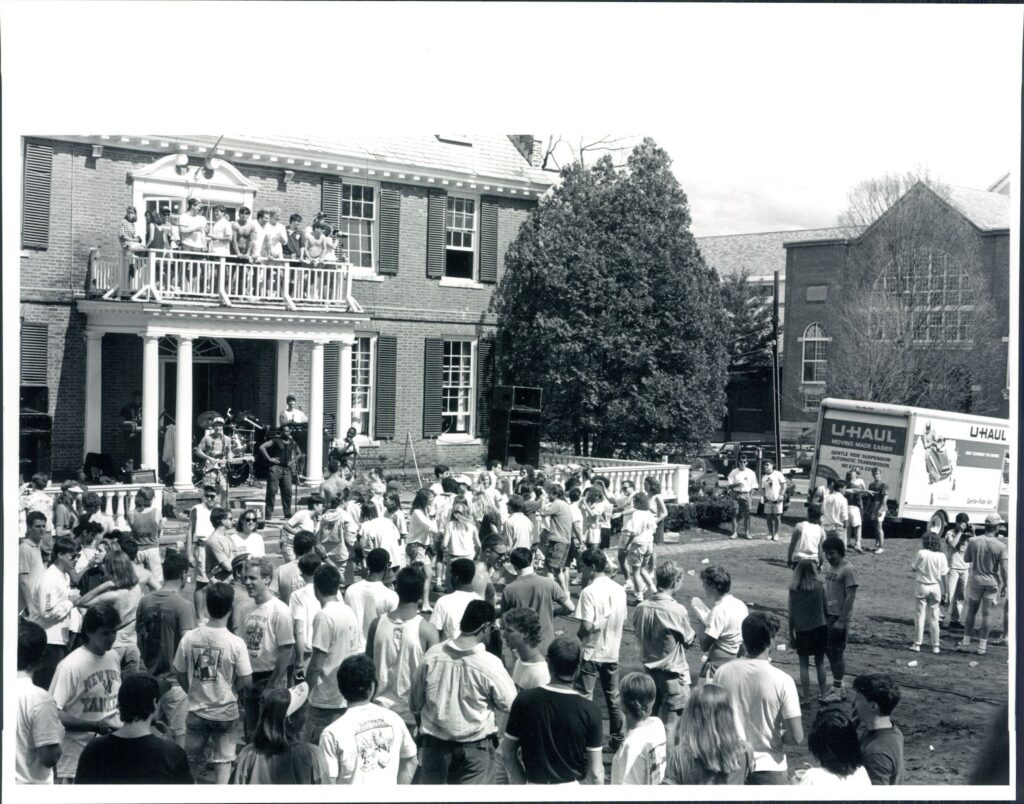
In recent weeks, the rush process has dominated campus life. In both fraternities and sororities, organizations that dominate campus life, the primary aim has been to recruit new members, a process that for some houses is a time for them to flaunt their egos and for others is a grueling, taxing process. When I originally joined my Greek house, I was in a pledge class of six people, a rather grim way to enter a house. Thankfully, that small class was just a blip in the road, and our most recent class has held healthy numbers. My fraternity experience was turbulent, with very testing times and some rewarding ones. Throughout all, I have been challenged in a number of different ways, but I believe all of them have been worthwhile.
Fraternities and fraternity culture occupy a paradoxically central and peripheral experience on campus. For many students, their Greek house is where they spend the majority of their free time, and yet judging by how the administration interacts with fraternities and sororities you would think that Greek houses would be marginal spaces on campus. The administration has adopted an attitude that as long as they don’t hear anything from them, they won’t bother them. This relationship has the upside of a certain degree of freedom, which is much appreciated from a Greek house perspective, but the administration is still seen as a mostly hostile force as a result of the College’s complicated relationships with Alpha Delta and SAE. In all, this uneven relationship means that Greek spaces rarely feel that they can reach out to the administration for help on any issues that might arise, so the twenty-two-year-olds who lead these communities make all the relative decisions for their other twenty-year-old peers with no oversight at all. Again without going into specifics, this structure leads to situations that edge on something found in Lord of the Flies more often than houses would like to admit.
While there are obvious downsides to this structure, one positive aspect is simply how challenging and forming these decisions and communities are for the students who participate in them. From here, the beauty of fraternities emerges. In today’s age, male friendships are hard to come by, and isolation and loneliness in men is a devastating and under-discussed force in society—and the problem certainly extends to College. Men are bonded by challenging experiences, and there are few organizations like fraternities that still have the ability to bond men in the same way. Yes, there are excesses that are unsavory and sometimes these “brotherhoods” decay into drama and hatred, but when they function properly, the relationships fraternities bear are beautiful and sacred.
Many of my dearest friendships have come from my fraternity, where I have formed friendships that I hope will last a long time with brothers who come from drastically different circumstances than me yet we are bonded by this shared, challenging experience. Male friendships and the care that comes from them are strange and under-appreciated elements of life. Inextricably attached to one’s masculinity, they challenged what we usually assume as “friendships” in modern parlance. Rather than everyone being kind to one another and talking to each other about their feelings, true friendship amongst males consists of almost abusive conditions (by today’s standards) where friends will go from degrading one another to lifting each other up in a matter of minutes. This extreme oscillation is uncomfortable at the outset by forever bonding once one enters into the agreement. There is something deeply sacred about these relationships, one which I am sure many who have participated in one of the fraternities on campus can attest to.
To those who have not experienced them, these friendships are threatening and concerning, remnants of an older era and thus must be stamped out. As a classics major, perhaps the most illuminating example that comes to mind is the recent questions over the nature of one of the earliest attested male friendships, that of Achilles and Patroclus in the Illiad. Rather than them being united in this sacred male friendship, more recent academics and cultural productions have sought to portray them not as friends, but as romantic lovers, and that their bond is not tied by a masculine friendship but by a sexual relationship between the two. In my experience, those that push the reading of them as lovers view it as a form of transgression, even though there is a multitude of plays and books that have this recasting and are supported by well-endowed and powerful institutions in the country. But more concerning to this article, reading Achilles and Patroclus as men who love one another, not in a romantic way, but a love tied deeply to their intense friendship is becoming increasingly incomprehensible today. Fraternities are a bulwark for this form of friendship, one that is at times off-putting and challenging but also fruitful, fulfilling, and uplifting.

Be the first to comment on "On Fraternity and Friendship"